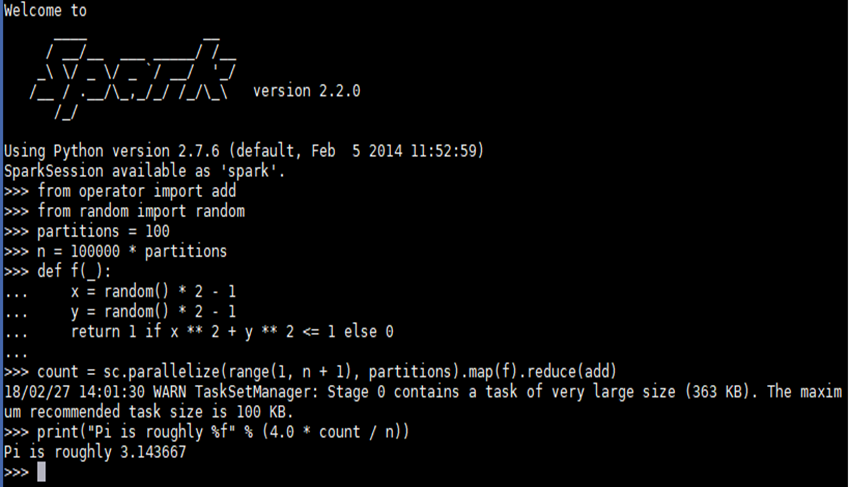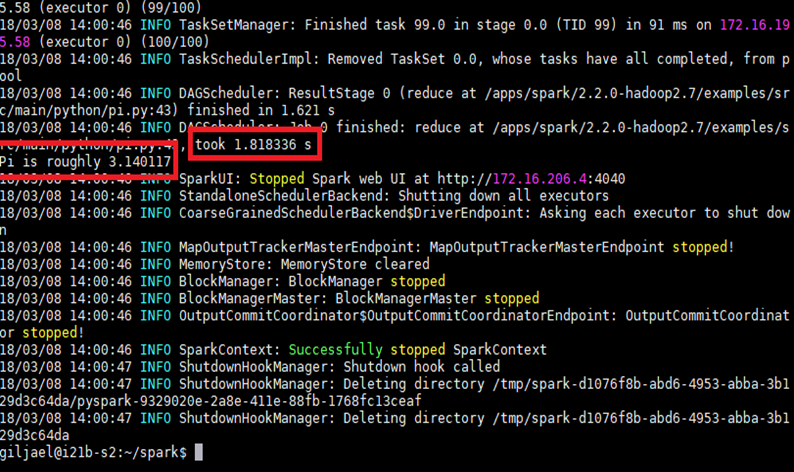Spark: Difference between revisions
No edit summary |
No edit summary |
||
| (19 intermediate revisions by 5 users not shown) | |||
| Line 1: | Line 1: | ||
[[Category:Software]][[Category: | [[Category:Software]][[Category:Utility]] | ||
{|<!--CONFIGURATION: REQUIRED--> | {|<!--CONFIGURATION: REQUIRED--> | ||
|{{#vardefine:app|spark}} | |{{#vardefine:app|spark}} | ||
| Line 6: | Line 6: | ||
|{{#vardefine:conf|}} <!--CONFIGURATION--> | |{{#vardefine:conf|}} <!--CONFIGURATION--> | ||
|{{#vardefine:exe|}} <!--ADDITIONAL INFO--> | |{{#vardefine:exe|}} <!--ADDITIONAL INFO--> | ||
|{{#vardefine:job|}} <!--JOB SCRIPTS--> | |{{#vardefine:job|1}} <!--JOB SCRIPTS--> | ||
|{{#vardefine:policy|}} <!--POLICY--> | |{{#vardefine:policy|}} <!--POLICY--> | ||
|{{#vardefine:testing|}} <!--PROFILING--> | |{{#vardefine:testing|}} <!--PROFILING--> | ||
| Line 24: | Line 24: | ||
Run <code>module spider {{#var:app}}</code> to find out what environment modules are available for this application. | Run <code>module spider {{#var:app}}</code> to find out what environment modules are available for this application. | ||
==System Variables== | ==System Variables== | ||
* HPC_{{ | * HPC_{{uc:{{#var:app}}}}_DIR - installation directory | ||
* HPC_{{ | * HPC_{{uc:{{#var:app}}}}_BIN - executable directory | ||
* HPC_{{ | * HPC_{{uc:{{#var:app}}}}_SLURM - SLURM job script examples | ||
* SPARK_HOME - examples directory | * SPARK_HOME - examples directory | ||
==Running Spark | ==Running Spark on HiperGator== | ||
To run your Spark jobs | To run your Spark jobs on HiperGator, two separate steps are required: | ||
===Spark cluster | # Create a Spark cluster on HiperGator via SLURM. This section "Spark Cluster on HiPerGator" below shows a simple example how to create a Spark cluster on HiperGator. | ||
# Submit your job to your Spark cluster. You can do this either interactively at the command line ("Spark Interactive Job" section below) or by submitting a a batch job ("Spark Batch Job" section below) | |||
For details about running Spark jobs on HiPerGator, please refer to [https://help.rc.ufl.edu/doc/Spark_Workshop Spark Workshop]. For Spark parameters used in this section, please refer to [https://spark.apache.org/ Spark's homepage]. | |||
===Spark cluster on HiperGator=== | |||
<div class="mw-collapsible mw-collapsed" style="width:70%; padding: 5px; border: 1px solid gray;"> | <div class="mw-collapsible mw-collapsed" style="width:70%; padding: 5px; border: 1px solid gray;"> | ||
''Expand this section to view instructions for creating a spark cluster in HiperGator.'' | ''Expand this section to view instructions for creating a spark cluster in HiperGator.'' | ||
<div class="mw-collapsible-content" style="padding: 5px;"> | <div class="mw-collapsible-content" style="padding: 5px;"> | ||
It is assumed that spark-local-cluster.sh is the file name of the SLURM job script for one-worker node Spark cluster in this section. | It is assumed that spark-local-cluster.sh is the file name of the SLURM job script for one-worker node Spark cluster in this section. | ||
Set SLURM parameters for Spark cluster. | Set SLURM parameters for Spark cluster. spark-local-cluster.sh is available on "Spark_Job_Scripts" page below. | ||
<pre> | |||
#!/bin/bash | #!/bin/bash | ||
#filename: spark-local-cluster.sh | #filename: spark-local-cluster.sh | ||
| Line 50: | Line 56: | ||
module load spark | module load spark | ||
Set Spark parameters for Spark cluster | ## Set Spark parameters for Spark cluster | ||
export SPARK_LOCAL_DIRS=$HOME/spark/tmp | export SPARK_LOCAL_DIRS=$HOME/spark/tmp | ||
export SPARK_WORKER_DIR=$SPARK_LOCAL_DIRS | export SPARK_WORKER_DIR=$SPARK_LOCAL_DIRS | ||
| Line 58: | Line 64: | ||
export SPARK_NO_DAEMONIZE=true | export SPARK_NO_DAEMONIZE=true | ||
export SPARK_LOG_DIR=$SPARK_LOCAL_DIRS | export SPARK_LOG_DIR=$SPARK_LOCAL_DIRS | ||
mkdir -p $SPARK_LOCAL_DIRS | mkdir -p $SPARK_LOCAL_DIRS | ||
Set Spark Master and Workers | ##Set Spark Master and Workers | ||
MASTER_HOST=$(scontrol show hostname $SLURM_NODELIST | head -n 1) | MASTER_HOST=$(scontrol show hostname $SLURM_NODELIST | head -n 1) | ||
export SPARK_MASTER_NODE=$(host $MASTER_HOST | head -1 | cut -d ' ' -f 4) | export SPARK_MASTER_NODE=$(host $MASTER_HOST | head -1 | cut -d ' ' -f 4) | ||
export MAX_SLAVES=$(expr $SLURM_JOB_NUM_NODES - 1) | export MAX_SLAVES=$(expr $SLURM_JOB_NUM_NODES - 1) | ||
# for starting spark master | |||
## for starting spark master | |||
$SPARK_HOME/sbin/start-master.sh & | $SPARK_HOME/sbin/start-master.sh & | ||
# use spark defaults for worker resources (all mem -1 GB, all cores) since using exclusive | |||
#for starting spark worker | ## use spark defaults for worker resources (all mem -1 GB, all cores) since using exclusive | ||
## for starting spark worker | |||
$SPARK_HOME/sbin/start-slave.sh spark://$SPARK_MASTER_NODE:$SPARK_MASTER_PORT | $SPARK_HOME/sbin/start-slave.sh spark://$SPARK_MASTER_NODE:$SPARK_MASTER_PORT | ||
</pre> | |||
Submit the SLURM job script to HiperGator | Submit the SLURM job script to HiperGator | ||
| Line 94: | Line 103: | ||
Spark supports interactive job submission through the interactive shells. | Spark supports interactive job submission through the interactive shells. | ||
;Spark interactive shell in Scalar (spark-shell) | |||
First, load spark module in the terminal where you want to submit a spark job. | First, load spark module in the terminal where you want to submit a spark job. | ||
module load spark | module load spark | ||
| Line 104: | Line 113: | ||
spark-shell --master $SPARK_MASTER | spark-shell --master $SPARK_MASTER | ||
;Spark interactive shell in Python (pyspark) | |||
Load spark module in the terminal where you want to submit a spark job. | Load spark module in the terminal where you want to submit a spark job. | ||
module load spark | module load spark | ||
| Line 114: | Line 123: | ||
pyspark --master $SPARK_MASTER | pyspark --master $SPARK_MASTER | ||
;Example - PI estimation via pyspark | |||
SPARK_MASTER=$(grep "Starting Spark master" *.err | cut -d " " -f 9) | SPARK_MASTER=$(grep "Starting Spark master" *.err | cut -d " " -f 9) | ||
pyspark --master $SPARK_MASTER | pyspark --master $SPARK_MASTER | ||
[[File:Pi_with_pyspark.png]] | |||
;Example - Pi estimation from file with pyspark | |||
As of Spark 2.0., Spark interactive shell in python does not load python files to run python application. Instead, “PYTHONSTARTUP”, a python environmental variable can be used to run python script with pyspark, which executes the python script before an interactive shell starts. | |||
SPARK_MASTER=$(grep "Starting Spark master" *.err | cut -d " " -f 9) | |||
PYTHONSTARTUP=pi_with_pythonstartup.py pyspark --master $SPARK_MASTER | |||
pi_with_pythonstartup.py script is avaialble on "Spark_Job_Scripts" page below. | |||
</div> | </div> | ||
</div> | </div> | ||
| Line 132: | Line 141: | ||
''Expand this section to view instructions for starting preset applications without a job script.'' | ''Expand this section to view instructions for starting preset applications without a job script.'' | ||
<div class="mw-collapsible-content" style="padding: 5px;"> | <div class="mw-collapsible-content" style="padding: 5px;"> | ||
Spark supports batch job submission through spark-submit. | Spark supports batch job submission through spark-submit which provides unified interface for Spark jobs | ||
$SPARK_HOME/bin/spark-submit \ | |||
--class <main-class> --master <master-url> \ | |||
--deploy-mode <deploy-mode> --conf <key>=<value> \ | |||
... # other options <application-jar> [application-arguments] | |||
--class: The entry point for your application (e.g. org.apache.spark.examples.SparkPi) | |||
--master: The master URL for the cluster (e.g. spark://123.45.67.890:7077) | |||
--deploy-mode: Whether to deploy your driver on the worker nodes (cluster) or locally as an external client (client) (default: client) | |||
--conf: Arbitrary Spark configuration property in key=value format. For values that contain spaces wrap “key=value” in quotes (as shown). | |||
<application-jar>: Path to a bundled jar including your application and all dependencies. The URL must be globally visible inside of your cluster, | |||
for instance, an hdfs:// path or a file:// path that is present on all nodes. | |||
<application-arguments>: Arguments passed to the main method of your main class, if any | |||
For further details about spark-submit, refer to https://spark.apache.org/docs/2.2.0/submitting-applications.html. | |||
;Example - Pi estimation via Spark-submit | |||
SPARK_MASTER=$(grep "Starting Spark master" *.err | cut -d " " -f 9) | |||
spark-submit --master $SPARK_MASTER $SPARK_HOME/examples/src/main/python/pi.py 10 | |||
[[File:Pi_spark-submit.png]] | |||
</div> | </div> | ||
| Line 150: | Line 177: | ||
<!--Job Scripts--> | <!--Job Scripts--> | ||
{{#if: {{#var: job}}|==Job Script Examples== | {{#if: {{#var: job}}|==Job Script Examples== | ||
<div class="mw-collapsible mw-collapsed" style="width:70%; padding: 5px; border: 1px solid gray;"> | |||
''Expand this section to view spark-local-cluster.sh'' | |||
<div class="mw-collapsible-content" style="padding: 5px;"> | |||
<source lang=bash> | |||
#!/bin/bash | |||
#filename: spark-local-cluster.sh | |||
#SBATCH --job-name=spark_cluster | |||
#SBATCH --nodes=1 # nodes allocated to the job | |||
#SBATCH --cpus-per-task=16 # the number of CPUs allocated per task | |||
#SBATCH --exclusive # not sharing of allocated nodes with other running jobs | |||
#SBATCH --time=03:00:00 | |||
#SBATCH --output=spark_cluster.log | |||
#SBATCH --error=spark_cluster.err | |||
###SBATCH --ntasks= # tasks to be created for the job | |||
###SBATCH --ntasks-per-core= # max number of tasks per allocated core | |||
###SBATCH --ntasks-per-node= # max number of tasks per allocated node | |||
###SBATCH --mail-type=END,FAIL | |||
###SBATCH --mail-user=<yourID>@ufl.edu | |||
module load spark | |||
### Set Spark variables | |||
export SPARK_LOCAL_DIRS=$HOME/spark/tmp | |||
export SPARK_WORKER_DIR=$SPARK_LOCAL_DIRS | |||
export SPARK_WORKER_CORES=$SLURM_CPUS_PER_TASK | |||
export SPARK_MASTER_PORT=7077 | |||
export SPARK_MASTER_WEBUI_PORT=8080 | |||
export SPARK_NO_DAEMONIZE=true | |||
export SPARK_LOG_DIR=$SPARK_LOCAL_DIRS | |||
#export SPARK_CONF_DIR=$SPARK_LOCAL_DIRS | |||
mkdir -p $SPARK_LOCAL_DIRS | |||
MASTER_HOST=$(scontrol show hostname $SLURM_NODELIST | head -n 1) | |||
export SPARK_MASTER_NODE=$(host $MASTER_HOST | head -1 | cut -d ' ' -f 4) | |||
export MAX_SLAVES=$(expr $SLURM_JOB_NUM_NODES - 1) | |||
# start master | |||
$SPARK_HOME/sbin/start-master.sh & | |||
# start workers | |||
# use spark defaults for worker resources (all mem -1 GB, all cores) since using exclusive | |||
$SPARK_HOME/sbin/start-slave.sh spark://$SPARK_MASTER_NODE:$SPARK_MASTER_PORT | |||
</source> | |||
</div> | |||
</div> | |||
<div class="mw-collapsible mw-collapsed" style="width:70%; padding: 5px; border: 1px solid gray;"> | |||
''Expand this section to view pi_with_pythonstartup.py'' | |||
<div class="mw-collapsible-content" style="padding: 5px;"> | |||
<source lang=python> | |||
from operator import add | |||
from random import random | |||
partitions =10 | |||
n = 100000 * partitions | |||
def f(_): | |||
x = random() * 2 - 1 | |||
y = random() * 2 - 1 | |||
return 1 if x ** 2 + y ** 2 <= 1 else 0 | |||
count = sc.parallelize(range(1, n + 1), partitions).map(f).reduce(add) | |||
print("Pi is roughly %f" % (4.0 * count / n)) | |||
</source> | |||
</div> | |||
</div> | |||
|}} | |}} | ||
<!--Policy--> | <!--Policy--> | ||
Latest revision as of 22:01, 15 December 2022
Description
Apache Spark is a fast and general-purpose cluster computing system. It provides high-level APIs in Java, Scala, Python and R, and an optimized engine that supports general execution graphs. It also supports a rich set of higher-level tools including Spark SQL for SQL and structured data processing, MLlib for machine learning, GraphX for graph processing, and Spark Streaming.
Environment Modules
Run module spider spark to find out what environment modules are available for this application.
System Variables
- HPC_SPARK_DIR - installation directory
- HPC_SPARK_BIN - executable directory
- HPC_SPARK_SLURM - SLURM job script examples
- SPARK_HOME - examples directory
Running Spark on HiperGator
To run your Spark jobs on HiperGator, two separate steps are required:
- Create a Spark cluster on HiperGator via SLURM. This section "Spark Cluster on HiPerGator" below shows a simple example how to create a Spark cluster on HiperGator.
- Submit your job to your Spark cluster. You can do this either interactively at the command line ("Spark Interactive Job" section below) or by submitting a a batch job ("Spark Batch Job" section below)
For details about running Spark jobs on HiPerGator, please refer to Spark Workshop. For Spark parameters used in this section, please refer to Spark's homepage.
Spark cluster on HiperGator
Expand this section to view instructions for creating a spark cluster in HiperGator.
Spark interactive job
Expand this section to view instructions for starting preset applications without a job script.
Spark batch job
Expand this section to view instructions for starting preset applications without a job script.
Job Script Examples
Expand this section to view spark-local-cluster.sh
Expand this section to view pi_with_pythonstartup.py

